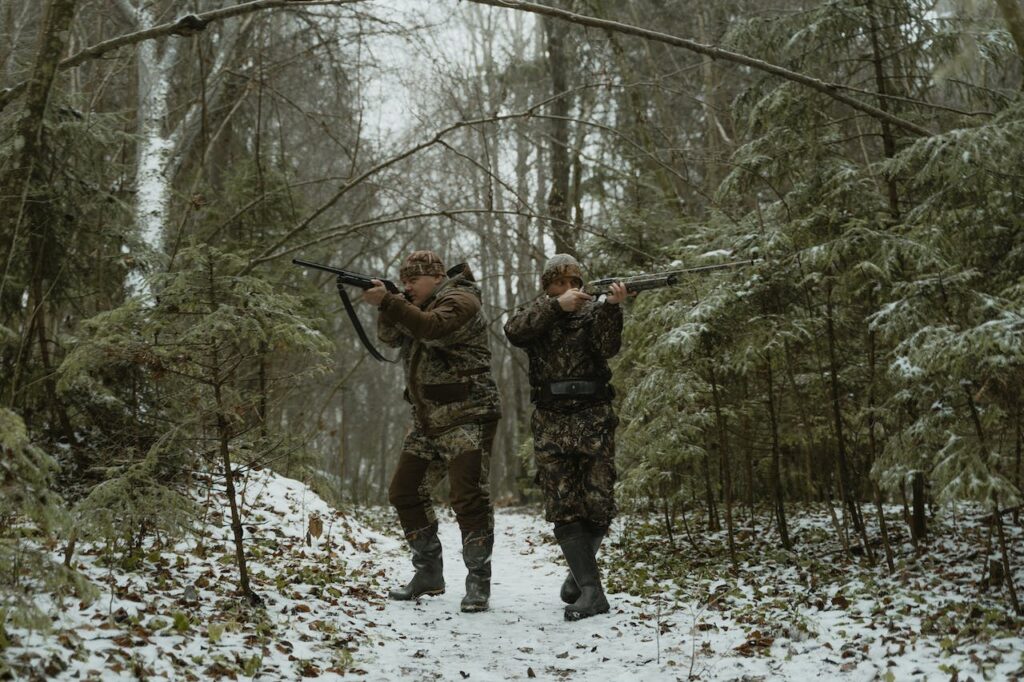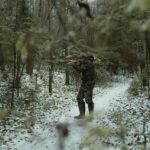Hunting plays a vital role in wildlife conservation by supporting habitat protection and restoration efforts. It helps balance wildlife populations and prevents overpopulation, which can lead to habitat destruction and disease outbreaks.
Additionally, hunting provides crucial funding for conservation programs through the purchase of hunting licenses and permits.
Hunting also contributes to nutrition by providing a natural and sustainable source of lean protein and essential nutrients. Wild game such as deer, antelope, elk, and moose offer a healthier alternative to store-bought meat, as they are free from antibiotics and hormones.
For individuals seeking a more natural and ethical approach to consuming meat, hunting offers a viable option.
In terms of wildlife population management, hunting serves as an effective tool for regulating animal populations and mitigating crop damage. State wildlife agencies utilize regulated hunting to address overpopulation of certain species and maintain a balanced ecosystem.
This helps prevent overgrazing, reduces conflicts between wildlife and agriculture, and ensures the overall health of the ecosystem.
Check out this Youtube video: “5 Reasons Why Hunting is Good – YouTube” to gain a deeper understanding of the importance of hunting for survival skills and wilderness ethics.
Hunting Supports Conservation Efforts
Contribution to Wildlife Habitat Preservation and Restoration
Hunting plays a vital role in the preservation and restoration of wildlife habitats. Through the strategic management of game animal populations, hunters actively contribute to ensuring the health and balance of these habitats.
For instance, the regulation of deer populations through hunting helps prevent overgrazing, which can lead to the destruction of natural vegetation and impact other wildlife species that depend on the same habitat.
Moreover, hunting initiatives often prioritize the restoration of specific habitats to enhance biodiversity. Hunters support these initiatives by adhering to strict regulations and participating in habitat restoration programs.
As a result, the efforts of hunters contribute significantly to the overall health and sustainability of various wildlife habitats, ensuring the conservation of natural ecosystems.
Example of Habitat Preservation and Restoration through Hunting
| Habitat | Conservation Efforts |
|---|---|
| Wetlands | Hunters support wetland conservation programs, effectively contributing to the restoration and protection of crucial wetland habitats. The participation of hunters ensures the sustainability of vital wetland ecosystems that are home to diverse wildlife species. |
Funding for Conservation and Wildlife Management
Hunting serves as a substantial source of funding for conservation and wildlife management efforts. The revenue generated from hunting activities, including the sale of hunting licenses and excise taxes on hunting equipment, directly supports conservation initiatives.
These funds play a pivotal role in financing various wildlife management programs, scientific research, and habitat restoration projects.
State wildlife agencies heavily rely on the financial contributions from hunters to implement and sustain their conservation and wildlife management endeavors. Additionally, federal programs such as the Federal Duck Stamp, supported by hunters, further bolster wildlife conservation funding.
It’s imperative to recognize the indispensable financial backing provided by hunters, which ensures the continuity of crucial conservation efforts across the nation.
Impact of Hunting on Conservation Funding
| Program | Impact of Hunting Contributions |
|---|---|
| Wildlife Management | Hunting-generated funds support wildlife management programs, contributing to the sustainable conservation of diverse species. |
| Scientific Research | Hunting revenue facilitates scientific research essential for evidence-based conservation and preservation strategies. |
Positive Impact on Ecosystem Balance and Biodiversity
Hunting activities have a positive impact on ecosystem balance and biodiversity. By actively participating in wildlife population management, hunters assist in curbing overpopulation and preserving the delicate balance within ecosystems.
Through the implementation of precise regulations and quotas, hunters play a crucial role in preventing ecological disruptions caused by unchecked wildlife populations.
Furthermore, the sustainable hunting practices contribute to biodiversity enhancement by fostering healthy wildlife populations. This, in turn, leads to a well-functioning ecosystem where various species coexist harmoniously.
Through their responsible and conservation-driven hunting practices, hunters significantly contribute to maintaining the intricate balance of ecosystems and promoting the richness of biodiversity.
Significance of Hunting in Ecosystem Balance and Biodiversity
| Biodiversity | Ecosystem Balance |
|---|---|
| Hunters contribute to preserving a diverse range of species, thus promoting biodiversity within ecosystems. | By managing wildlife populations, hunters prevent ecological imbalances, ensuring the stability and health of ecosystems. |
Hunting as a Good Source of Nutrition
Sustainable and Organic Meat Source
Hunting stands as a remarkable means of acquiring sustainable and organic meat. Wild game meat, such as venison, elk, or bison, provides several health benefits compared to conventionally raised livestock. It is a pure protein, free from preservatives or additives, offering a lean, “free-range” protein product similar to that of organic food stores. Furthermore, it’s important to note that hunting can provide organic, low-fat protein at a lower cost compared to commercially produced meat. Notably, the fundamentals of ethical hunting are the backbone of a sustainable lifestyle and the key to a truly organic meat source, reiterating the importance of hunting in securing organic meat options.
| Wild Game Meat Benefits | Comparison to Conventional Meat | Sustainable and Organic Features |
|---|---|---|
| Pure, Organic Protein | Lower Fat Content | Sustainable and Eco-friendly |
| No Additives or Preservatives | Comparative Nutritional Data | Promotes Ethical and Sustainable Lifestyles |
Connection to Local and Natural Food Resources
Furthermore, hunting establishes a vital connection to local and natural food resources. New hunters inherently understand the importance of cultivating their skills to grow and harvest their own food in a sustainable and ethical manner. It connects individuals to the environment and fosters an understanding of the origin of their food. Additionally, it promotes a sense of responsibility and appreciation for natural ecosystems, highlighting the intrinsic link between local communities and the natural resources available.
Promotion of Healthy Eating and Lifestyle
Hunting significantly contributes to the promotion of healthy eating and lifestyle. It is important to note that hunting involves physical movement, mental preparedness, and provides nutritional benefits. The act of hunting encourages individuals to engage in physical activity while fostering a sense of mindfulness and concentration. Also, hunting is closely tied to the consumption of fresh, organic meat, promoting a healthy diet. Furthermore, hunting offers a connection with nature, as it often involves spending time outdoors in natural environments. This connection to nature can promote feelings of calmness, relaxation, and overall well-being.
Hunting Contributes to Wildlife Population Management
Hunting plays a crucial role in maintaining wildlife population management by controlling overpopulation and the spread of diseases. Through sustainable hunting practices, the population of certain species can be effectively managed to prevent overpopulation, which can lead to resource depletion and ecosystem imbalance. Additionally, hunting assists in controlling the spread of diseases among wildlife populations, thereby contributing to overall ecosystem health and stability.
Control of Overpopulation and Disease Spread
By regulating hunting activities, wildlife overpopulation can be kept in check, preventing the detrimental effects of overcrowding on the ecosystem. Overpopulation can lead to increased competition for resources, habitat destruction, and a decline in the overall health of a species.
Furthermore, hunting serves as a critical tool in managing disease spread within wildlife populations. By controlling the number of animals, the risk of disease transmission and outbreak can be minimized, ultimately contributing to the well-being and sustainability of the ecosystem.
Regulation of Species Population for Ecosystem Health
Through the regulation of species population, hunting ensures the health and balance of ecosystems. Overpopulation of certain species can negatively impact vegetation, leading to habitat degradation and reduced biodiversity.
By managing species population through hunting, the natural equilibrium of the ecosystem can be preserved, allowing for the sustainable coexistence of wildlife and their surrounding environment. This balanced approach is essential in safeguarding the delicate interdependence of flora and fauna within ecosystems.
Reduction of Human-Wildlife Conflicts
Furthermore, hunting aids in mitigating human-wildlife conflicts by regulating the population of wildlife species that often come into direct contact with human settlements. By managing the population of such species, conflicts related to crop damage, property destruction, and threats to human safety can be minimized.
This proactive approach not only ensures the well-being of human communities but also promotes the cohabitation of wildlife and human populations in a harmonious and sustainable manner.
Wildlife Population Management Benefits of Hunting
| Benefits of Hunting for Wildlife Population Management |
|---|
| 1. Control of overpopulation and disease spread |
| 2. Regulation of species population for ecosystem health |
| 3. Reduction of human-wildlife conflicts |
Hunting significantly contributes to wildlife population management by effectively controlling overpopulation, preventing the spread of diseases, regulating species population for ecosystem health, and reducing human-wildlife conflicts. These multifaceted benefits underscore the indispensable role of hunting in ensuring the sustainability and balance of wildlife populations and their surrounding ecosystems.
Hunting Stimulates the Economy
Economic Benefits for Rural Communities
Hunting stimulates the economy by providing significant economic benefits to rural communities. The influx of revenue from hunting activities injects vital income into these areas, supporting local businesses and services that may otherwise struggle to survive.
This financial boost sustains community infrastructure and enhances the standard of living for rural residents, fostering a thriving local economy.
Beyond the economic aspects, hunting also fosters a deeper connection between rural communities and the natural environment. This bond reinforces conservation efforts and environmental stewardship, as hunters often play a vital role in preserving and protecting the natural habitats that are crucial to their activities.
Therefore, by supporting hunting, we are also enacting a form of environmental preservation, ensuring that local ecosystems remain intact for generations to come.
Job Creation in Hunting-related Industries
The hunting industry plays a pivotal role in job creation, offering diverse employment opportunities within hunting-related sectors. From outfitters and hunting guides to gunsmiths and outdoor writers, the industry sustains a wide array of employment prospects that cater to various skill sets and interests.
This not only provides livelihoods for individuals but also contributes to the overall economic stability of communities.
Furthermore, the economic impact of hunting transcends job creation, extending to broader industry support such as lodging, food services, and retail. These industries, closely interlinked with hunting, also contribute significantly to job creation and economic growth, amplifying the positive impact on both rural and urban areas.
| Job Position | Average Salary |
|---|---|
| Outfitter | $40,000 |
| Gunsmith | $45,000 |
| Hunting Guide | $35,000 |
| Store Manager | $50,000 |
| Outdoor Writer | $55,000 |
Revenue Generation for Small Businesses and Local Governments
Hunting activities generate substantial revenues for small businesses and local governments, bolstering their financial capabilities and sustainability. The expenditure associated with hunting, including gear purchases, lodging, and dining, channels a steady stream of income into local businesses.
This revenue sustains these establishments, enabling them to thrive and expand their operations, ultimately fostering greater economic growth within the community.
For local governments, the revenue generated from hunting activities translates into increased tax incomes, empowering them to invest in essential public services and infrastructural development. Therefore, hunting serves as a vital economic pillar, contributing to the financial stability and growth of small businesses and local governments, while simultaneously nourishing the economic prosperity of rural and urban areas.
Recommended Amazon Products for Hunting Enthusiasts
Here’s a curated list of products that can help you enjoy hunting with ease. These recommendations are based on the functionality, price, and positive reviews.
Vortex Optics Crossfire II
The Vortex Optics Crossfire II is a highly recommended hunting scope due to its clear optics and durable build. Its long eye relief and fast-focus eyepiece make it an excellent choice for hunting. Check out the Vortex Optics Crossfire II on Amazon for a reliable, high-performance scope.
| Pros | Cons |
|---|---|
| Clear optics | Slightly heavy |
| Durable build | |
| Long eye relief |
North Mountain Gear Camouflage Gloves
These high-quality gloves offer excellent grip and protection from the elements while hunting. With a camouflage design, they blend seamlessly with the environment. Find the North Mountain Gear Camouflage Gloves on Amazon for a comfortable and practical hunting accessory.
| Pros | Cons |
|---|---|
| Excellent grip | Not touch screen compatible |
| Protection from elements | |
| Camouflage design |
ScentLok Full Season Taktix Hunting Jacket
The ScentLok Full Season Taktix Hunting Jacket is designed to keep hunters comfortable and scent-free in the field. Its innovative features make it an ideal choice for dedicated hunters. Discover the ScentLok Full Season Taktix Hunting Jacket on Amazon for a reliable hunting jacket.
| Pros | Cons |
|---|---|
| Scent control technology | Relatively expensive |
| Comfortable fit | |
| Durable build |
Top Recommended Product for Outdoor Enthusiasts
If you’re looking for the best solution for your hunting needs, we highly recommend the Vortex Optics Crossfire II (https://www.amazon.com/s?k=Vortex+Optics+Crossfire+II). Here’s why: The Vortex Optics Crossfire II offers exceptional clarity and a durable build for prolonged use in the field. It provides excellent value for its price, making it an ideal investment for hunting enthusiasts. Ready to enhance your hunting experiences? Check out the Vortex Optics Crossfire II today for the best results!
Frequently Asked Questions
Why hunting is good for the environment?
What is the point of hunting?
What does hunting teach you about life?
What is the most important reason for hunters?
What are good hunting questions?
Reference Links
- https://pubmed.ncbi.nlm.nih.gov/11974627/
- https://ugc.berkeley.edu/background-content/fishing-hunting/
- https://www.quora.com/Does-hunting-really-help-conservation-What-do-actual-wildlife-conservationists-say-about-it
- https://cnr.ncsu.edu/news/2021/02/hunting-wildlife-conservation-explained/
- https://www.indeed.com/career-advice/finding-a-job/hunting-industry-jobs







